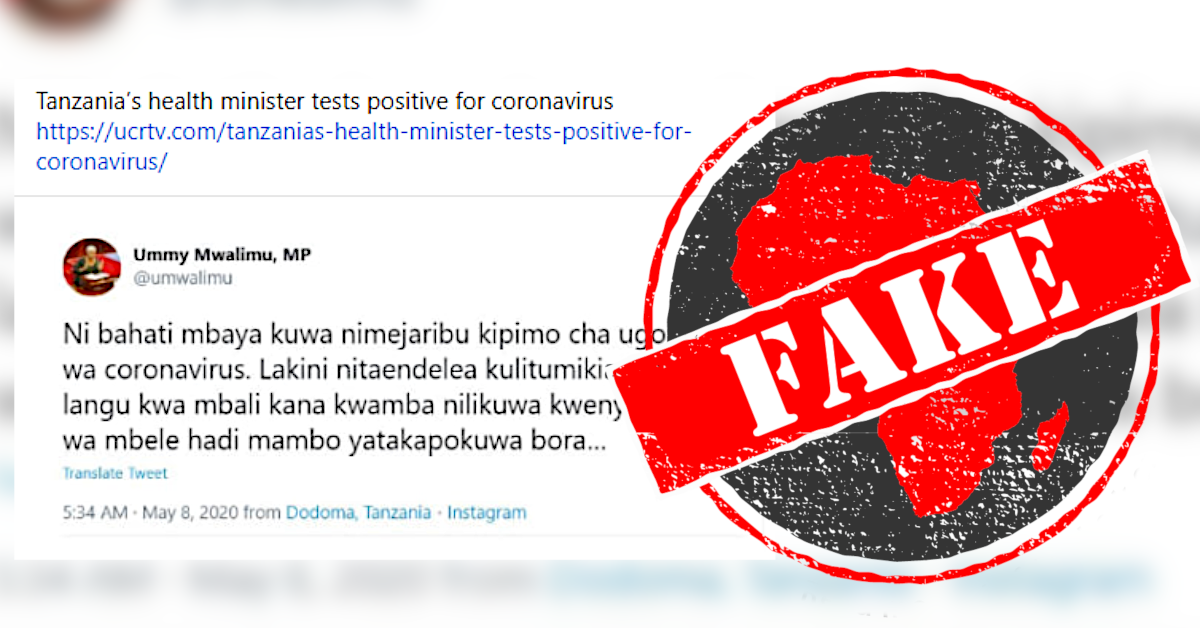A Facebook post shows what seems to be a tweet by Tanzania’s health minister, Ummy Mwalimu, announcing she has tested positive for Covid-19.
It reads: “Ni Bahati mbaya kuwa nimejaribu kipimo cha ugonjwa wa coronavirus. Lakini nitaendelea kulitumikia taifa langu kwa mbali kana kwamba nilikuwa kwenye mstari wa mbele hadi mambo yatakapokuwa bora.”
Loosely translated from Kiswahili, this means: “It’s by bad luck that I have tested positive for coronavirus. But I will continue to serve my country remotely just like I was on the frontline, until things get better.”
The 8 May 2020 post links to an article on the site UCR World News, headlined “Tanzania’s health minister tests positive for coronavirus”. The article’s only source is the supposed tweet, which it shares.
The claim has been made elsewhere on Facebook.
Covid-19 cases have been rising in Tanzania, with 509 cases as at 13 May 2020, according to WHO.
But did the country’s health minister tweet that she had also tested positive for the disease? We checked.

The tweet is fake.
Twitter’s date and location stamp at the bottom of the tweet reads: “5:34 AM May 8, 2020 from Dodoma, Tanzania • Instagram”.
Mwalimu’s tweets on 8 May give her location as Dar es Salaam, on the east coast of Tanzania. Dodoma is in the west of the country, more than 440 kilometres and an eight-hour drive from Dar.
And the minister tweets on Twitter for iPhone – not from “Instagram”.
More than this, the minister’s “announcement” was not reported by any mainstream news outlets, as would be expected.
In the evening of 8 May, Mwalimu took to Twitter to dismiss the claim.
She shared the screenshot of the tweet and the UCR World News article with “FAKE” stamped across them in red.
“Mimi kupata Corona sio ajabu wala aibu. Hata hivyo Taarifa hii sio ya Kweli, ipuuzwe,” she tweeted.
This translates as: “My contracting coronavirus would be neither remarkable nor shameful. But these reports are not true. Ignore them.” – Grace Gichuhi
It reads: “Ni Bahati mbaya kuwa nimejaribu kipimo cha ugonjwa wa coronavirus. Lakini nitaendelea kulitumikia taifa langu kwa mbali kana kwamba nilikuwa kwenye mstari wa mbele hadi mambo yatakapokuwa bora.”
Loosely translated from Kiswahili, this means: “It’s by bad luck that I have tested positive for coronavirus. But I will continue to serve my country remotely just like I was on the frontline, until things get better.”
The 8 May 2020 post links to an article on the site UCR World News, headlined “Tanzania’s health minister tests positive for coronavirus”. The article’s only source is the supposed tweet, which it shares.
The claim has been made elsewhere on Facebook.
Covid-19 cases have been rising in Tanzania, with 509 cases as at 13 May 2020, according to WHO.
But did the country’s health minister tweet that she had also tested positive for the disease? We checked.

Tweeted from 400km away
The tweet is fake.
Twitter’s date and location stamp at the bottom of the tweet reads: “5:34 AM May 8, 2020 from Dodoma, Tanzania • Instagram”.
Mwalimu’s tweets on 8 May give her location as Dar es Salaam, on the east coast of Tanzania. Dodoma is in the west of the country, more than 440 kilometres and an eight-hour drive from Dar.
And the minister tweets on Twitter for iPhone – not from “Instagram”.
More than this, the minister’s “announcement” was not reported by any mainstream news outlets, as would be expected.
‘Reports not true. Ignore them’
In the evening of 8 May, Mwalimu took to Twitter to dismiss the claim.
She shared the screenshot of the tweet and the UCR World News article with “FAKE” stamped across them in red.
“Mimi kupata Corona sio ajabu wala aibu. Hata hivyo Taarifa hii sio ya Kweli, ipuuzwe,” she tweeted.
This translates as: “My contracting coronavirus would be neither remarkable nor shameful. But these reports are not true. Ignore them.” – Grace Gichuhi
Republish our content for free
For publishers: what to do if your post is rated false
A fact-checker has rated your Facebook or Instagram post as “false”, “altered”, “partly false” or “missing context”. This could have serious consequences. What do you do?
Click on our guide for the steps you should follow.
Publishers guideAfrica Check teams up with Facebook
Africa Check is a partner in Meta's third-party fact-checking programme to help stop the spread of false information on social media.
The content we rate as “false” will be downgraded on Facebook and Instagram. This means fewer people will see it.
You can also help identify false information on Facebook. This guide explains how.


Add new comment